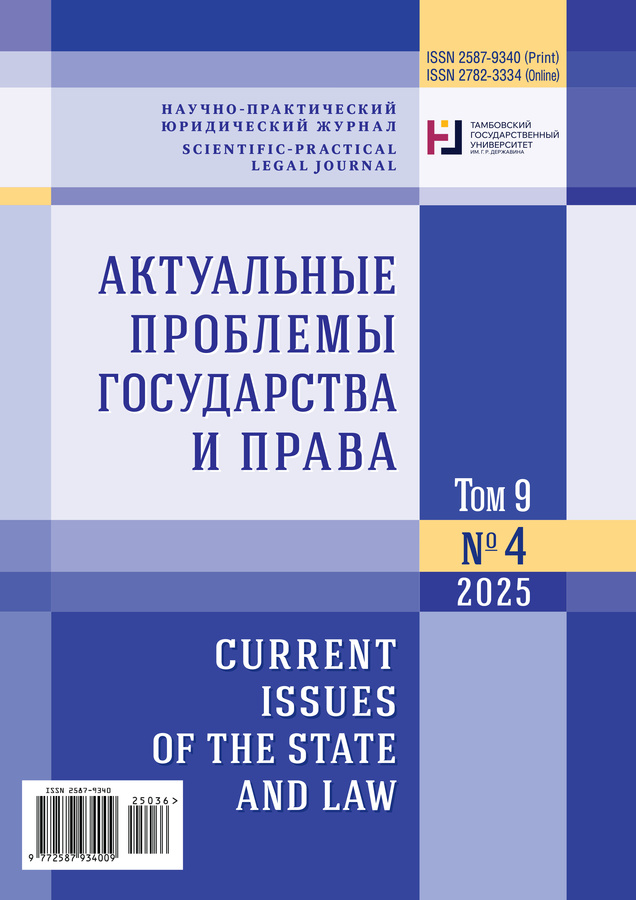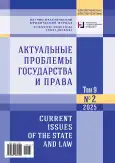Норма-дефиниция искусственного интеллекта: новый взгляд
- Авторы: КОВАНОВ Е.С.1
-
Учреждения:
- ФГБОУ ВО «Владимирский государственный университет им. Александра Григорьевича и Николая Григорьевича Столетовых»
- Выпуск: Том 9, № 2 (2025)
- Страницы: 206-217
- Раздел: Общая теория и история права и государства
- URL: https://journal-vniispk.ru/2587-9340/article/view/299465
- ID: 299465
Цитировать
Полный текст
Аннотация
Рассмотрены основные санкционированные подходы дефинитивного описания феномена искусственного интеллекта на примере Российской Федерации и зарубежных государственно-правовых образований (Великобритании, США, Евросоюза). Подробно описаны недостатки и проблемные места каждого признанного терминологического определения. Указаны конкретные моменты, в чем именно заключается их несовершенство. Среди отечественных исследователей рассматривались авторские позиции И.В. Понкина и А.И. Редькиной, П.М. Морхата, А.В. Минбалиева, Ю.Г. Арзамасова, которые при всех объективных достоинствах также содержат элемент незавершенности. Предложена и разъяснена авторская норма-дефиниция искусственного интеллекта, что состоит из пяти обязательных компонентов: комплексной технологии, человекоподобной деятельности, решения определенных задач, «умственного» функционала и условной автономии. Сама норма-дефиниция, которая должна войти в понятийный аппарат профильного федерального закона, сформулирована следующим образом: «искусственный интеллект – комплексная технология, способная к автономному ведению человекоподобной деятельности, направленной на надлежащее выполнение конкретных задач соразмерно присущей имитации умственных параметров. К понятию «комплексная технология» относятся целостная аппаратно-программная инфраструктура, регулируемая среда для работы с данными и для достижения определенных результатов, системы по наблюдению и контролю, единая информационно-коммуникационная платформа». В заключительной части сделан вывод о том, что именно правильное описание исследуемой инновации в праве способно привести страну к лидерству в данной области.
Об авторах
Евгений Сергеевич КОВАНОВ
ФГБОУ ВО «Владимирский государственный университет им. Александра Григорьевича и Николая Григорьевича Столетовых»
Автор, ответственный за переписку.
Email: zhekasso@mail.ru
аспирант Юридического института
Россия, Российская Федерация, 600000, г. Владимир, ул. Горького, 87Список литературы
- Мусаева А.С. Терминообразование в сфере искусственного интеллекта // Верхневолжский филологический вестник. 2022. № 2 (29). С. 166-173. https://doi.org/10.20323/2499-9679-2022-2-29-166-173, https://elibrary.ru/gkpovv
- Белов С.А. Роль языка в обеспечении понятности и определенности нормативных правовых актов // Вестник Санкт-Петербургского университета. 2022. Т 13. № 2. С. 293-308. https://doi.org/10.21638/spbu14.2022.201, https://elibrary.ru/nykocp
- Peiris H., Hayat M., Chen Z. et al. Uncertainty-guided dual-views for semi-supervised volumetric medical image segmentation // Nature Machine Intelligence. 2023. № 5 (7). P. 724-738. https://doi.org/10.1038/s42256-023-00682-w
- Щербакова М.М. Когнитивные нарушения и их реабилитация в неврологической клинике (психологический подход). М.: Изд-во В. Секачев, 2021. 228 с.
- Понкин И.В., Редькина А.И. Искусственный интеллект с точки зрения права // Вестник РУДН. Серия: Юридические науки. 2018. Т. 22. № 1. С. 91-109. https://doi.org/10.22363/2313-2337-2018-22-1-91-109, https://elibrary.ru/yvxkva
- Морхат П.М. Правосубъектность искусственного интеллекта в сфере права интеллектуальной собственности: гражданско-правовые проблемы: автореф. дис. … канд. юрид. наук. М., 2018. 44 с.
- Минбалеев А.В. Понятие «Искусственный интеллект» в праве // Вестник Удмуртского университета. Экономика и право. 2022. Т. 32. № 6. С. 1094-1099. https://doi.org/10.35634/2412-9593-2022-32-6-1094-1099, https://elibrary.ru/mptqye
- Арзамасов Ю.Г. Комплексный подход к определению искусственного интеллекта // Вестник Воронежского государственного университета. Серия: Право. 2022. № 3 (50). С. 242-262. https://doi.org/10.17308/law/1995-5502/2022/3/242-262, https://elibrary.ru/wdnzxk
- Lingjiao Chen, Matei Zaharia, James Zou. How Is ChatGPT’s Behavior Changing over Time? // Cornell University. 2023. P. 1-26. https://doi.org/10.48550/arXiv.2307.09009
Дополнительные файлы










